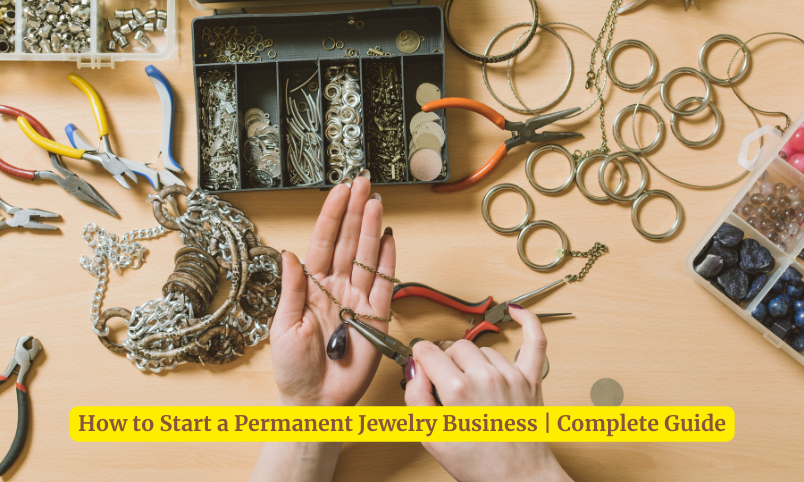A Comprehensive Guide to Launching a Jewelry Business: From Concept to Customer
Related Articles: A Comprehensive Guide to Launching a Jewelry Business: From Concept to Customer
Introduction
In this auspicious occasion, we are delighted to delve into the intriguing topic related to A Comprehensive Guide to Launching a Jewelry Business: From Concept to Customer. Let’s weave interesting information and offer fresh perspectives to the readers.
Table of Content
A Comprehensive Guide to Launching a Jewelry Business: From Concept to Customer

The allure of jewelry transcends mere adornment; it embodies artistry, emotion, and personal expression. For many, the dream of crafting and sharing this beauty with the world translates into the desire to establish a jewelry business. This comprehensive guide provides a step-by-step roadmap for navigating the exciting, yet complex, journey of launching a successful jewelry venture.
1. Defining Your Niche and Brand Identity
The foundation of any successful business lies in clarity of purpose. Before embarking on the entrepreneurial journey, it is imperative to define your niche and craft a compelling brand identity.
- Identifying Your Target Audience: Who are you creating jewelry for? Understanding your target audience’s demographics, preferences, and purchasing habits is crucial. Are you catering to a specific age group, style aesthetic, or budget?
- Defining Your Unique Selling Proposition (USP): What makes your jewelry stand out? Is it the use of unique materials, intricate craftsmanship, ethical sourcing, or a specific design philosophy?
- Developing a Brand Story: Every brand has a story. What is yours? What are the values and principles that underpin your jewelry creation? This narrative helps connect with customers on an emotional level.
2. Crafting Your Jewelry: Skill Development and Sourcing
The core of a jewelry business lies in the art of crafting beautiful and desirable pieces.
- Skill Development: Whether you are a seasoned artisan or a novice, continuous learning is essential. Invest in workshops, online courses, or mentorship to hone your skills in jewelry design, fabrication, and setting.
- Sourcing Materials: Choosing the right materials is critical. Research suppliers offering high-quality materials at competitive prices. Consider factors such as ethical sourcing, sustainability, and the durability of materials.
- Developing a Design Portfolio: Showcase your best work in a professional portfolio. This visual representation is essential for attracting potential customers, investors, or partners.
3. Establishing Your Business Structure
The legal structure of your business impacts your liability, taxation, and administrative processes.
- Sole Proprietorship: This is the simplest structure, where the business is owned and operated by one person. It is relatively easy to set up but offers limited liability protection.
- Partnership: Two or more individuals share ownership and responsibility for the business. It can offer greater resources and expertise but requires careful partnership agreements.
- Limited Liability Company (LLC): This structure offers greater liability protection, separating personal assets from business liabilities. It can be more complex to set up and manage.
- Corporation: This is a separate legal entity from its owners, providing significant liability protection but involves more complex legal and regulatory requirements.
4. Financial Planning and Funding
A sound financial plan is essential for the sustainability of your jewelry business.
- Creating a Business Plan: A comprehensive business plan outlines your business goals, target market, marketing strategy, financial projections, and funding requirements.
- Estimating Costs: Accurately calculate the costs associated with your business, including materials, labor, marketing, rent, utilities, and insurance.
- Securing Funding: Explore various funding options, such as personal savings, loans, grants, crowdfunding, or angel investors.
5. Setting Up Your Workshop and Inventory Management
A well-organized workshop and efficient inventory management are crucial for smooth operations.
- Workshop Setup: Create a dedicated workspace with appropriate tools, equipment, and safety measures.
- Inventory Management: Develop a system for tracking your inventory, including materials, finished products, and supplies. This ensures efficient ordering, prevents stockouts, and minimizes waste.
6. Marketing and Branding Your Jewelry Business
Marketing is the bridge connecting your beautiful creations with your target audience.
- Developing a Brand Identity: Create a strong brand identity that reflects your unique style and values. This includes a logo, brand colors, typography, and a consistent visual aesthetic.
- Building an Online Presence: Establish a professional website and social media profiles. Use high-quality photography, engaging content, and strategic marketing to attract customers.
- Marketing Channels: Explore various marketing channels, including online advertising, social media marketing, influencer collaborations, email marketing, and public relations.
- Crafting a Compelling Narrative: Share your brand story, design inspiration, and the craftsmanship behind your jewelry. Connect with customers on an emotional level.
7. Pricing and Sales Strategy
Pricing your jewelry correctly is essential for profitability and customer satisfaction.
- Cost-Plus Pricing: Calculate the cost of materials, labor, and overhead, and add a markup percentage to determine your selling price.
- Value-Based Pricing: Consider the perceived value of your jewelry and the market demand.
- Competitive Pricing: Research the prices of similar jewelry from competitors.
- Sales Strategy: Develop a sales strategy that includes pricing, discounts, promotions, and loyalty programs.
8. Legal and Regulatory Compliance
Navigating legal and regulatory requirements is crucial for a successful business.
- Business Licenses and Permits: Obtain the necessary licenses and permits to operate legally.
- Taxes: Understand your tax obligations and comply with tax regulations.
- Insurance: Secure adequate insurance coverage to protect your business from potential risks.
- Intellectual Property Protection: Consider trademarking your brand name or unique designs.
9. Customer Service and Feedback
Excellent customer service is key to building a loyal customer base.
- Responding Promptly: Respond to customer inquiries and concerns in a timely and professional manner.
- Providing Excellent Service: Offer personalized service, package orders carefully, and provide clear instructions for care.
- Collecting Feedback: Seek customer feedback to understand their needs and improve your products and services.
10. Scaling Your Business
As your business grows, consider strategies for scaling your operations.
- Expanding Your Product Line: Introduce new collections, materials, or styles to appeal to a wider customer base.
- Hiring Staff: As your workload increases, consider hiring additional staff to support production, marketing, and customer service.
- Exploring Wholesale or Partnerships: Consider selling your jewelry wholesale to other retailers or collaborating with other businesses.
FAQs on Starting a Jewelry Business
1. What are the essential skills needed to start a jewelry business?
The most essential skills include:
- Jewelry Design and Fabrication: The ability to create and craft jewelry pieces.
- Marketing and Sales: Knowledge of marketing strategies and sales techniques.
- Business Management: Skills in financial planning, accounting, inventory management, and customer service.
2. How much money do I need to start a jewelry business?
The initial investment depends on factors such as:
- The scale of your business: A small, home-based business will require less capital than a larger, retail-based operation.
- The type of jewelry you create: High-end jewelry made with precious metals and gemstones will require a greater investment than simpler pieces made with less expensive materials.
- Your business structure: An LLC or corporation will typically have higher setup costs than a sole proprietorship.
3. Where can I find funding for my jewelry business?
- Personal savings: This is the most common source of funding for startups.
- Loans: Consider small business loans from banks, credit unions, or online lenders.
- Grants: Research government grants or private foundation grants specifically for small businesses or creative industries.
- Crowdfunding: Utilize online platforms like Kickstarter or Indiegogo to raise funds from supporters.
- Angel investors: Seek funding from individuals who invest in early-stage businesses.
4. How do I find suppliers for my jewelry materials?
- Online marketplaces: Platforms like Etsy, Amazon, and Alibaba offer a wide range of materials from various suppliers.
- Industry trade shows: Attend jewelry trade shows to connect with suppliers and see the latest materials.
- Local suppliers: Explore local bead shops, metal suppliers, or gemstone dealers.
5. How can I market my jewelry business online?
- Build a professional website: Showcase your jewelry, brand story, and contact information.
- Create social media accounts: Use platforms like Instagram, Pinterest, and Facebook to connect with your target audience.
- Run online advertising campaigns: Utilize platforms like Google Ads or Facebook Ads to target potential customers.
- Collaborate with influencers: Partner with individuals who have a strong following in your niche.
- Use email marketing: Build an email list and send regular newsletters featuring new collections, promotions, or behind-the-scenes content.
6. How do I price my jewelry?
- Cost-plus pricing: Calculate the cost of materials, labor, and overhead, and add a markup percentage.
- Value-based pricing: Consider the perceived value of your jewelry and the market demand.
- Competitive pricing: Research the prices of similar jewelry from competitors.
7. What are the legal requirements for starting a jewelry business?
- Business licenses and permits: Obtain the necessary licenses and permits to operate legally in your state or municipality.
- Taxes: Understand your tax obligations and comply with tax regulations.
- Insurance: Secure adequate insurance coverage to protect your business from potential risks, such as liability, property damage, and product liability.
- Intellectual property protection: Consider trademarking your brand name or unique designs.
Tips for Starting a Jewelry Business
- Focus on your passion: Choose a niche that excites you and aligns with your creative vision.
- Develop a strong brand identity: Create a unique brand that resonates with your target audience.
- Invest in quality materials: Use high-quality materials to create durable and beautiful jewelry.
- Provide excellent customer service: Build relationships with your customers and provide a positive experience.
- Stay up-to-date with trends: Keep an eye on industry trends to stay relevant and competitive.
- Network with other jewelry professionals: Attend industry events, join online communities, and connect with other artisans.
- Don’t be afraid to experiment: Try new techniques, explore different materials, and push your creative boundaries.
Conclusion
Launching a jewelry business is a rewarding journey that requires dedication, passion, and a strategic approach. By defining your niche, developing your skills, crafting a compelling brand identity, and navigating the legal and financial aspects of starting a business, you can lay a solid foundation for success. Remember, the key to building a thriving jewelry business is to create beautiful pieces that resonate with your target audience, provide exceptional customer service, and consistently adapt to the ever-evolving jewelry landscape.








Closure
Thus, we hope this article has provided valuable insights into A Comprehensive Guide to Launching a Jewelry Business: From Concept to Customer. We thank you for taking the time to read this article. See you in our next article!